Accounting for Management
VerifiedAdded on 2022/12/15
|14
|3640
|78
AI Summary
The study topic deals with the performance budgeting standard and the overall expected change in the budgeting standard. On the other hand the topic also deals with the improvement of the performance standard related to the agency theory along with the suitable conclusion at the end.
Contribute Materials
Your contribution can guide someone’s learning journey. Share your
documents today.
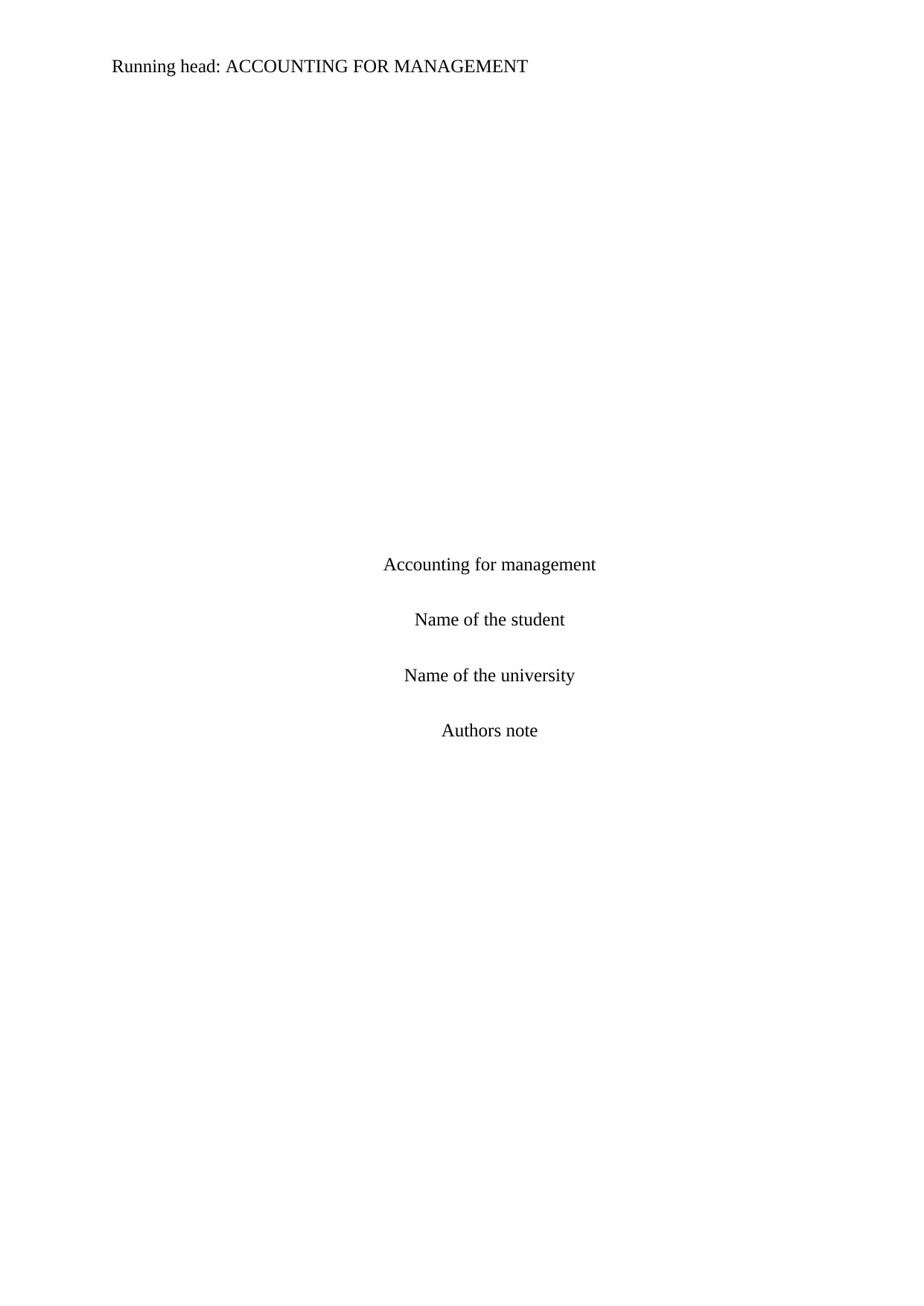
Running head: ACCOUNTING FOR MANAGEMENT
Accounting for management
Name of the student
Name of the university
Authors note
Accounting for management
Name of the student
Name of the university
Authors note
Secure Best Marks with AI Grader
Need help grading? Try our AI Grader for instant feedback on your assignments.
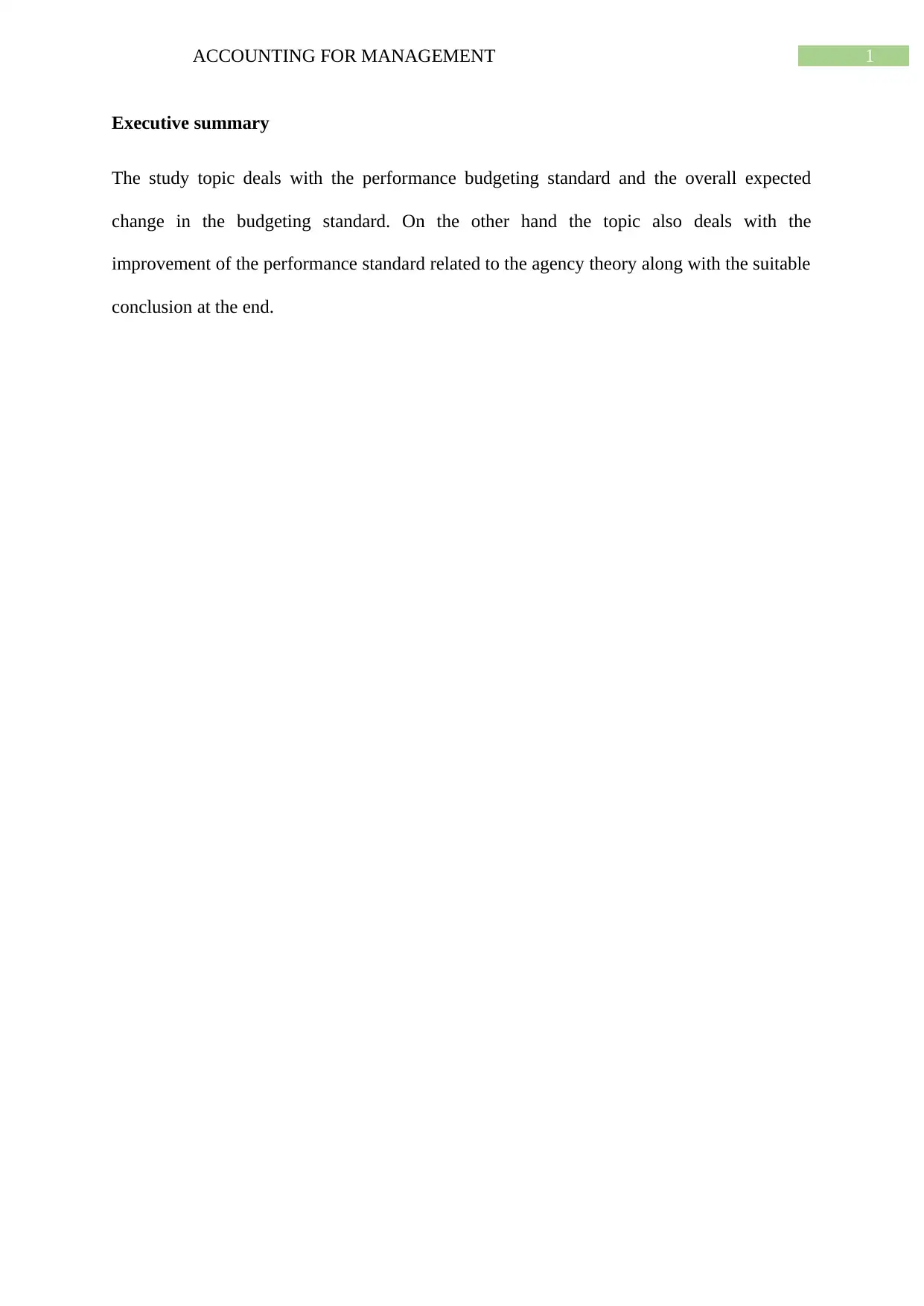
1ACCOUNTING FOR MANAGEMENT
Executive summary
The study topic deals with the performance budgeting standard and the overall expected
change in the budgeting standard. On the other hand the topic also deals with the
improvement of the performance standard related to the agency theory along with the suitable
conclusion at the end.
Executive summary
The study topic deals with the performance budgeting standard and the overall expected
change in the budgeting standard. On the other hand the topic also deals with the
improvement of the performance standard related to the agency theory along with the suitable
conclusion at the end.
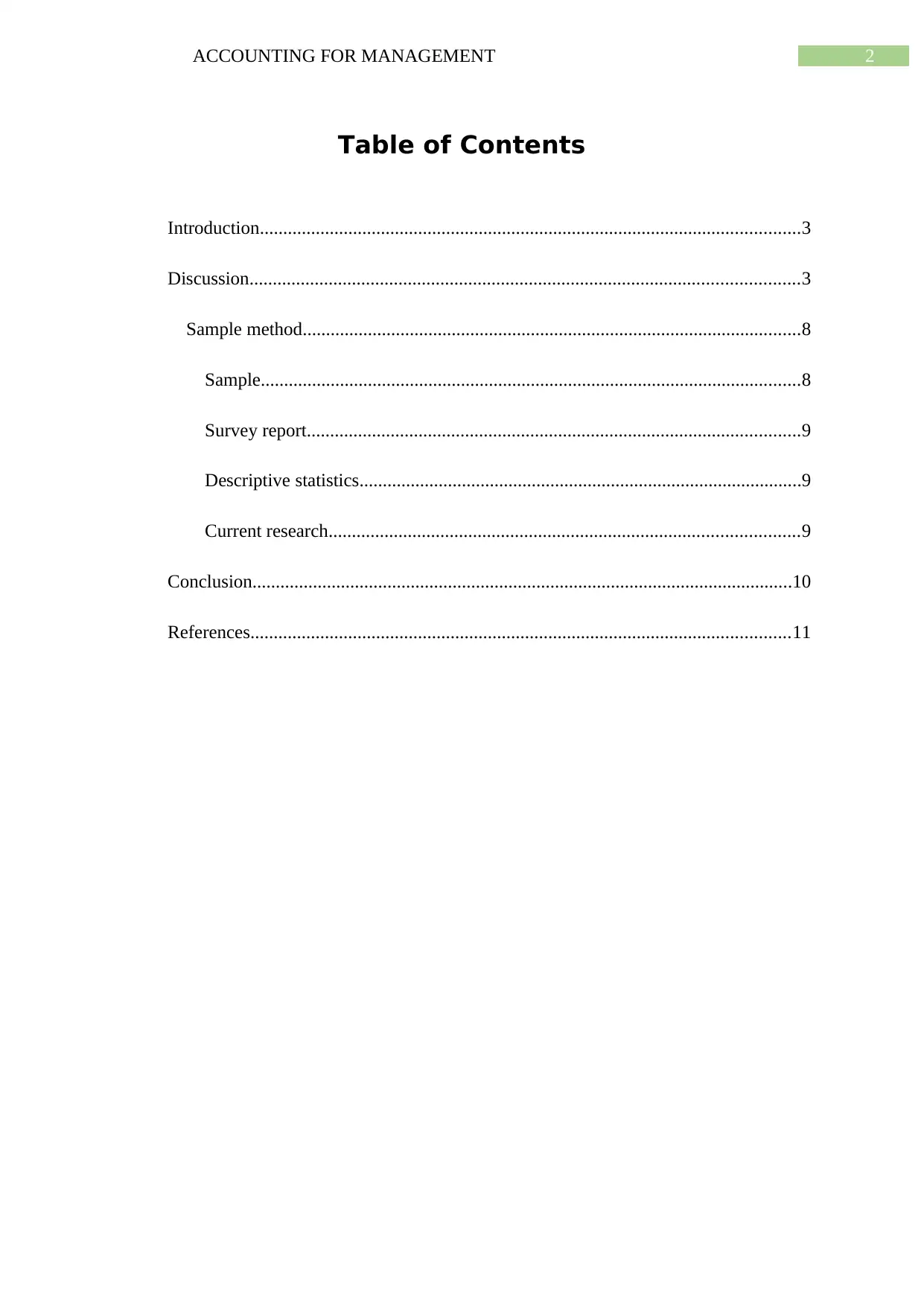
2ACCOUNTING FOR MANAGEMENT
Table of Contents
Introduction....................................................................................................................3
Discussion......................................................................................................................3
Sample method...........................................................................................................8
Sample....................................................................................................................8
Survey report..........................................................................................................9
Descriptive statistics...............................................................................................9
Current research.....................................................................................................9
Conclusion....................................................................................................................10
References....................................................................................................................11
Table of Contents
Introduction....................................................................................................................3
Discussion......................................................................................................................3
Sample method...........................................................................................................8
Sample....................................................................................................................8
Survey report..........................................................................................................9
Descriptive statistics...............................................................................................9
Current research.....................................................................................................9
Conclusion....................................................................................................................10
References....................................................................................................................11
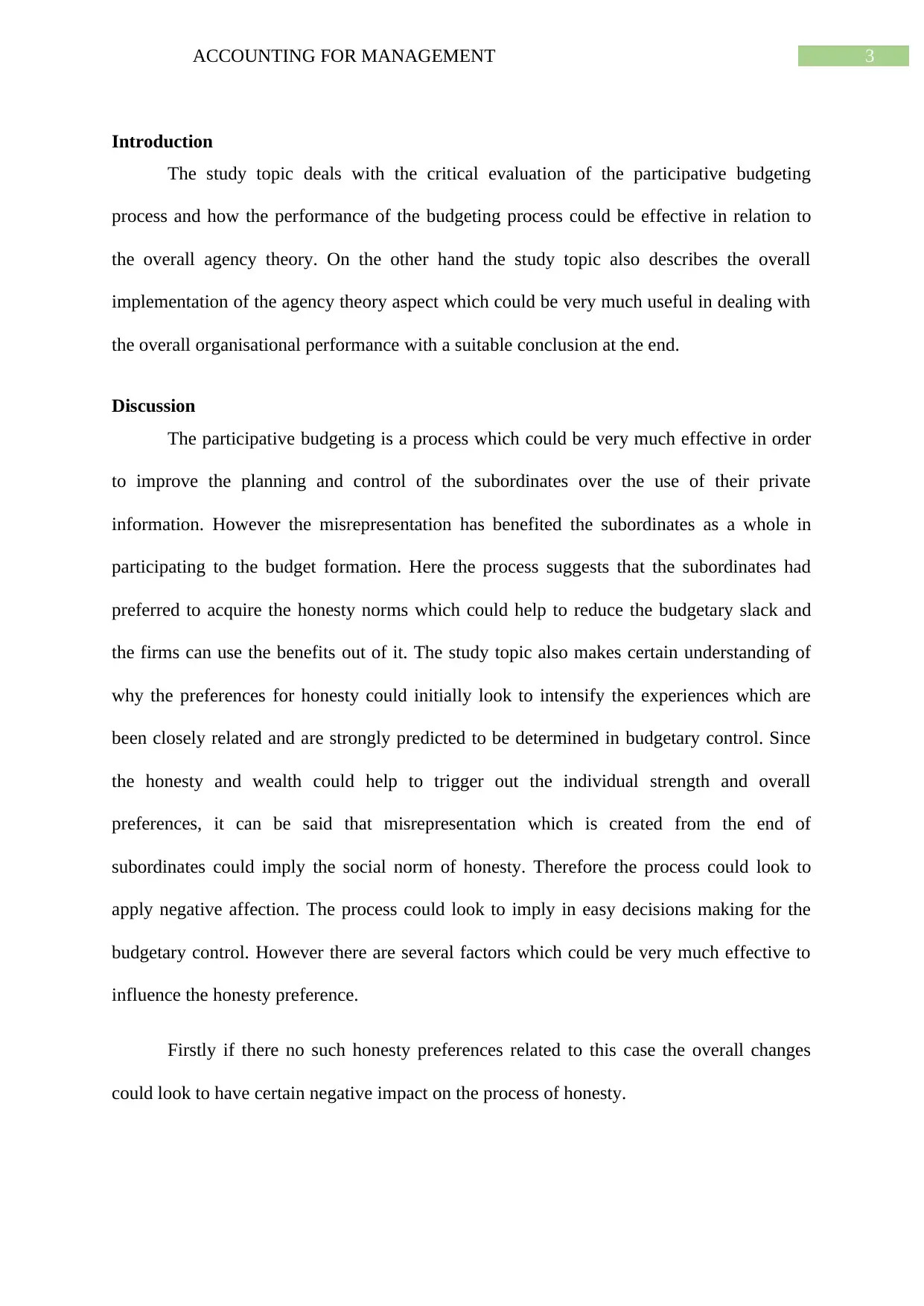
3ACCOUNTING FOR MANAGEMENT
Introduction
The study topic deals with the critical evaluation of the participative budgeting
process and how the performance of the budgeting process could be effective in relation to
the overall agency theory. On the other hand the study topic also describes the overall
implementation of the agency theory aspect which could be very much useful in dealing with
the overall organisational performance with a suitable conclusion at the end.
Discussion
The participative budgeting is a process which could be very much effective in order
to improve the planning and control of the subordinates over the use of their private
information. However the misrepresentation has benefited the subordinates as a whole in
participating to the budget formation. Here the process suggests that the subordinates had
preferred to acquire the honesty norms which could help to reduce the budgetary slack and
the firms can use the benefits out of it. The study topic also makes certain understanding of
why the preferences for honesty could initially look to intensify the experiences which are
been closely related and are strongly predicted to be determined in budgetary control. Since
the honesty and wealth could help to trigger out the individual strength and overall
preferences, it can be said that misrepresentation which is created from the end of
subordinates could imply the social norm of honesty. Therefore the process could look to
apply negative affection. The process could look to imply in easy decisions making for the
budgetary control. However there are several factors which could be very much effective to
influence the honesty preference.
Firstly if there no such honesty preferences related to this case the overall changes
could look to have certain negative impact on the process of honesty.
Introduction
The study topic deals with the critical evaluation of the participative budgeting
process and how the performance of the budgeting process could be effective in relation to
the overall agency theory. On the other hand the study topic also describes the overall
implementation of the agency theory aspect which could be very much useful in dealing with
the overall organisational performance with a suitable conclusion at the end.
Discussion
The participative budgeting is a process which could be very much effective in order
to improve the planning and control of the subordinates over the use of their private
information. However the misrepresentation has benefited the subordinates as a whole in
participating to the budget formation. Here the process suggests that the subordinates had
preferred to acquire the honesty norms which could help to reduce the budgetary slack and
the firms can use the benefits out of it. The study topic also makes certain understanding of
why the preferences for honesty could initially look to intensify the experiences which are
been closely related and are strongly predicted to be determined in budgetary control. Since
the honesty and wealth could help to trigger out the individual strength and overall
preferences, it can be said that misrepresentation which is created from the end of
subordinates could imply the social norm of honesty. Therefore the process could look to
apply negative affection. The process could look to imply in easy decisions making for the
budgetary control. However there are several factors which could be very much effective to
influence the honesty preference.
Firstly if there no such honesty preferences related to this case the overall changes
could look to have certain negative impact on the process of honesty.
Secure Best Marks with AI Grader
Need help grading? Try our AI Grader for instant feedback on your assignments.
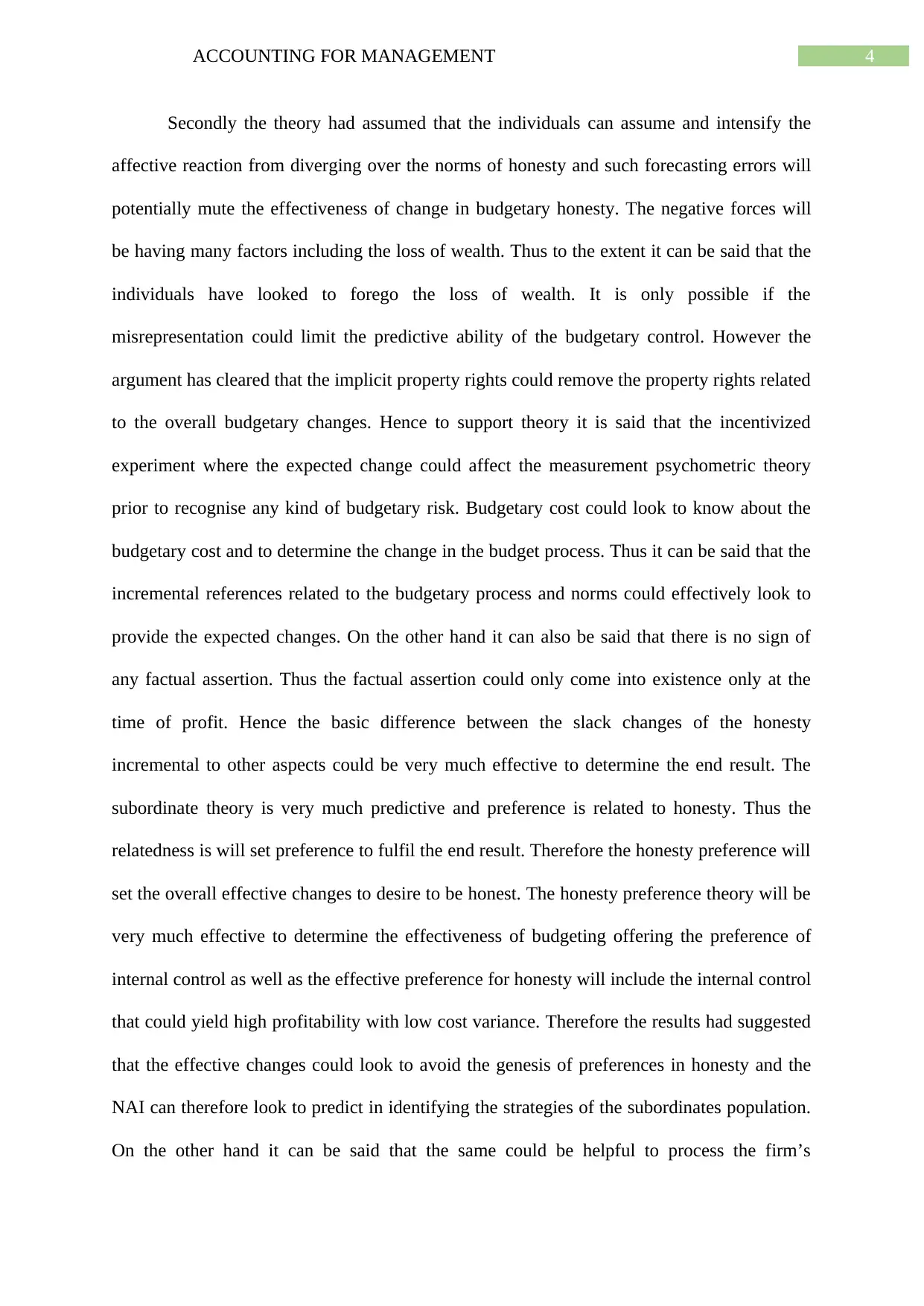
4ACCOUNTING FOR MANAGEMENT
Secondly the theory had assumed that the individuals can assume and intensify the
affective reaction from diverging over the norms of honesty and such forecasting errors will
potentially mute the effectiveness of change in budgetary honesty. The negative forces will
be having many factors including the loss of wealth. Thus to the extent it can be said that the
individuals have looked to forego the loss of wealth. It is only possible if the
misrepresentation could limit the predictive ability of the budgetary control. However the
argument has cleared that the implicit property rights could remove the property rights related
to the overall budgetary changes. Hence to support theory it is said that the incentivized
experiment where the expected change could affect the measurement psychometric theory
prior to recognise any kind of budgetary risk. Budgetary cost could look to know about the
budgetary cost and to determine the change in the budget process. Thus it can be said that the
incremental references related to the budgetary process and norms could effectively look to
provide the expected changes. On the other hand it can also be said that there is no sign of
any factual assertion. Thus the factual assertion could only come into existence only at the
time of profit. Hence the basic difference between the slack changes of the honesty
incremental to other aspects could be very much effective to determine the end result. The
subordinate theory is very much predictive and preference is related to honesty. Thus the
relatedness is will set preference to fulfil the end result. Therefore the honesty preference will
set the overall effective changes to desire to be honest. The honesty preference theory will be
very much effective to determine the effectiveness of budgeting offering the preference of
internal control as well as the effective preference for honesty will include the internal control
that could yield high profitability with low cost variance. Therefore the results had suggested
that the effective changes could look to avoid the genesis of preferences in honesty and the
NAI can therefore look to predict in identifying the strategies of the subordinates population.
On the other hand it can be said that the same could be helpful to process the firm’s
Secondly the theory had assumed that the individuals can assume and intensify the
affective reaction from diverging over the norms of honesty and such forecasting errors will
potentially mute the effectiveness of change in budgetary honesty. The negative forces will
be having many factors including the loss of wealth. Thus to the extent it can be said that the
individuals have looked to forego the loss of wealth. It is only possible if the
misrepresentation could limit the predictive ability of the budgetary control. However the
argument has cleared that the implicit property rights could remove the property rights related
to the overall budgetary changes. Hence to support theory it is said that the incentivized
experiment where the expected change could affect the measurement psychometric theory
prior to recognise any kind of budgetary risk. Budgetary cost could look to know about the
budgetary cost and to determine the change in the budget process. Thus it can be said that the
incremental references related to the budgetary process and norms could effectively look to
provide the expected changes. On the other hand it can also be said that there is no sign of
any factual assertion. Thus the factual assertion could only come into existence only at the
time of profit. Hence the basic difference between the slack changes of the honesty
incremental to other aspects could be very much effective to determine the end result. The
subordinate theory is very much predictive and preference is related to honesty. Thus the
relatedness is will set preference to fulfil the end result. Therefore the honesty preference will
set the overall effective changes to desire to be honest. The honesty preference theory will be
very much effective to determine the effectiveness of budgeting offering the preference of
internal control as well as the effective preference for honesty will include the internal control
that could yield high profitability with low cost variance. Therefore the results had suggested
that the effective changes could look to avoid the genesis of preferences in honesty and the
NAI can therefore look to predict in identifying the strategies of the subordinates population.
On the other hand it can be said that the same could be helpful to process the firm’s
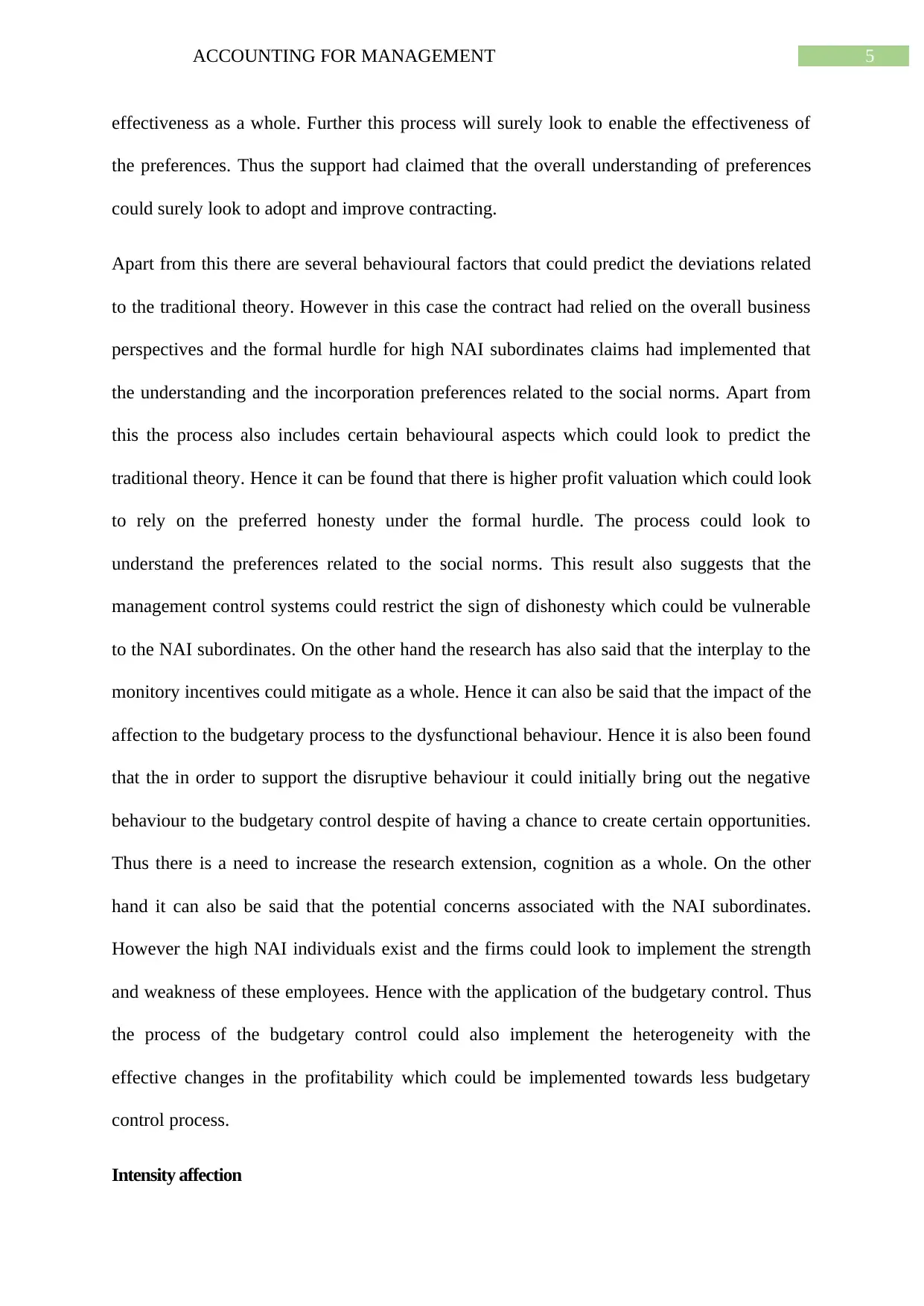
5ACCOUNTING FOR MANAGEMENT
effectiveness as a whole. Further this process will surely look to enable the effectiveness of
the preferences. Thus the support had claimed that the overall understanding of preferences
could surely look to adopt and improve contracting.
Apart from this there are several behavioural factors that could predict the deviations related
to the traditional theory. However in this case the contract had relied on the overall business
perspectives and the formal hurdle for high NAI subordinates claims had implemented that
the understanding and the incorporation preferences related to the social norms. Apart from
this the process also includes certain behavioural aspects which could look to predict the
traditional theory. Hence it can be found that there is higher profit valuation which could look
to rely on the preferred honesty under the formal hurdle. The process could look to
understand the preferences related to the social norms. This result also suggests that the
management control systems could restrict the sign of dishonesty which could be vulnerable
to the NAI subordinates. On the other hand the research has also said that the interplay to the
monitory incentives could mitigate as a whole. Hence it can also be said that the impact of the
affection to the budgetary process to the dysfunctional behaviour. Hence it is also been found
that the in order to support the disruptive behaviour it could initially bring out the negative
behaviour to the budgetary control despite of having a chance to create certain opportunities.
Thus there is a need to increase the research extension, cognition as a whole. On the other
hand it can also be said that the potential concerns associated with the NAI subordinates.
However the high NAI individuals exist and the firms could look to implement the strength
and weakness of these employees. Hence with the application of the budgetary control. Thus
the process of the budgetary control could also implement the heterogeneity with the
effective changes in the profitability which could be implemented towards less budgetary
control process.
Intensity affection
effectiveness as a whole. Further this process will surely look to enable the effectiveness of
the preferences. Thus the support had claimed that the overall understanding of preferences
could surely look to adopt and improve contracting.
Apart from this there are several behavioural factors that could predict the deviations related
to the traditional theory. However in this case the contract had relied on the overall business
perspectives and the formal hurdle for high NAI subordinates claims had implemented that
the understanding and the incorporation preferences related to the social norms. Apart from
this the process also includes certain behavioural aspects which could look to predict the
traditional theory. Hence it can be found that there is higher profit valuation which could look
to rely on the preferred honesty under the formal hurdle. The process could look to
understand the preferences related to the social norms. This result also suggests that the
management control systems could restrict the sign of dishonesty which could be vulnerable
to the NAI subordinates. On the other hand the research has also said that the interplay to the
monitory incentives could mitigate as a whole. Hence it can also be said that the impact of the
affection to the budgetary process to the dysfunctional behaviour. Hence it is also been found
that the in order to support the disruptive behaviour it could initially bring out the negative
behaviour to the budgetary control despite of having a chance to create certain opportunities.
Thus there is a need to increase the research extension, cognition as a whole. On the other
hand it can also be said that the potential concerns associated with the NAI subordinates.
However the high NAI individuals exist and the firms could look to implement the strength
and weakness of these employees. Hence with the application of the budgetary control. Thus
the process of the budgetary control could also implement the heterogeneity with the
effective changes in the profitability which could be implemented towards less budgetary
control process.
Intensity affection
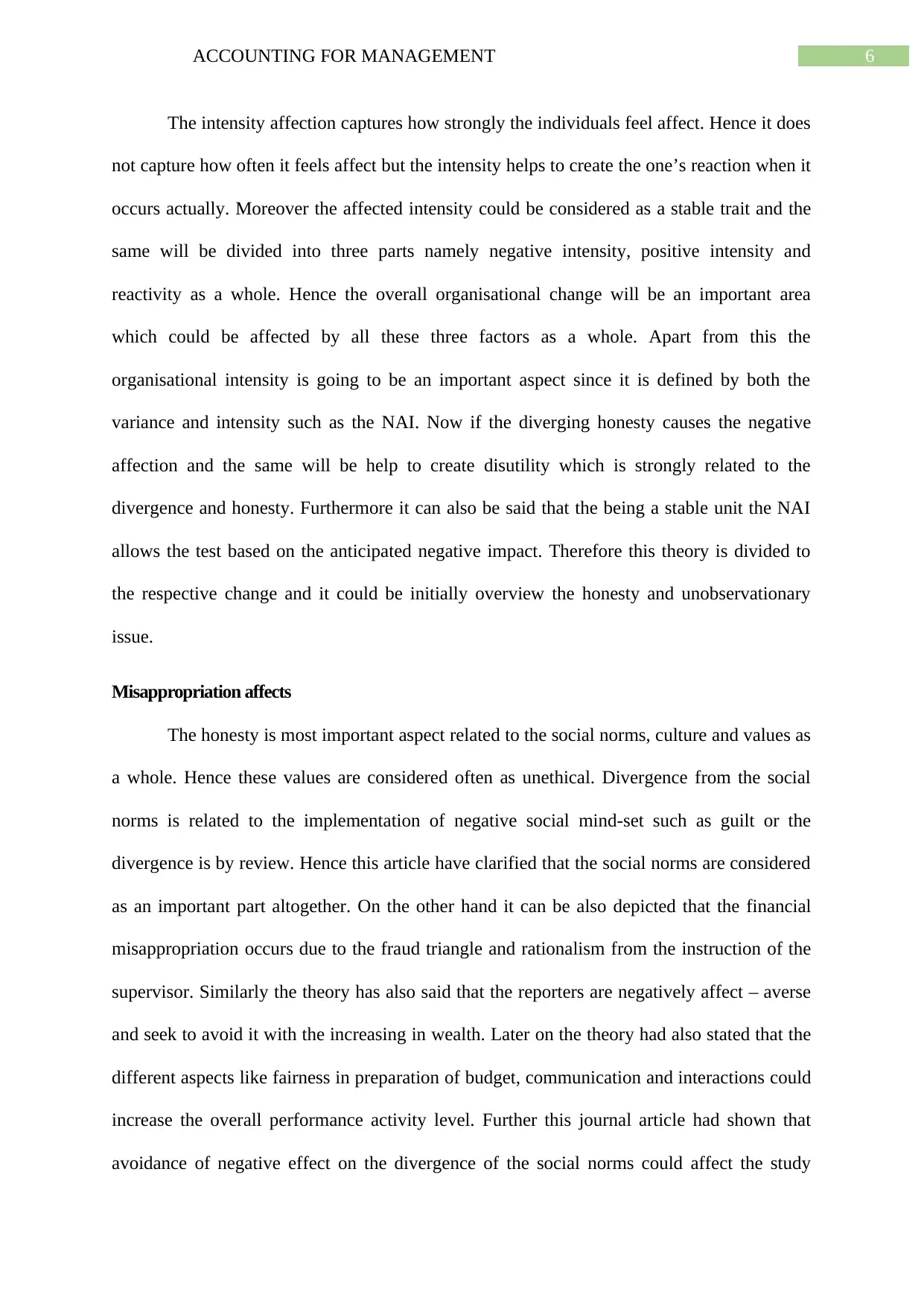
6ACCOUNTING FOR MANAGEMENT
The intensity affection captures how strongly the individuals feel affect. Hence it does
not capture how often it feels affect but the intensity helps to create the one’s reaction when it
occurs actually. Moreover the affected intensity could be considered as a stable trait and the
same will be divided into three parts namely negative intensity, positive intensity and
reactivity as a whole. Hence the overall organisational change will be an important area
which could be affected by all these three factors as a whole. Apart from this the
organisational intensity is going to be an important aspect since it is defined by both the
variance and intensity such as the NAI. Now if the diverging honesty causes the negative
affection and the same will be help to create disutility which is strongly related to the
divergence and honesty. Furthermore it can also be said that the being a stable unit the NAI
allows the test based on the anticipated negative impact. Therefore this theory is divided to
the respective change and it could be initially overview the honesty and unobservationary
issue.
Misappropriation affects
The honesty is most important aspect related to the social norms, culture and values as
a whole. Hence these values are considered often as unethical. Divergence from the social
norms is related to the implementation of negative social mind-set such as guilt or the
divergence is by review. Hence this article have clarified that the social norms are considered
as an important part altogether. On the other hand it can be also depicted that the financial
misappropriation occurs due to the fraud triangle and rationalism from the instruction of the
supervisor. Similarly the theory has also said that the reporters are negatively affect – averse
and seek to avoid it with the increasing in wealth. Later on the theory had also stated that the
different aspects like fairness in preparation of budget, communication and interactions could
increase the overall performance activity level. Further this journal article had shown that
avoidance of negative effect on the divergence of the social norms could affect the study
The intensity affection captures how strongly the individuals feel affect. Hence it does
not capture how often it feels affect but the intensity helps to create the one’s reaction when it
occurs actually. Moreover the affected intensity could be considered as a stable trait and the
same will be divided into three parts namely negative intensity, positive intensity and
reactivity as a whole. Hence the overall organisational change will be an important area
which could be affected by all these three factors as a whole. Apart from this the
organisational intensity is going to be an important aspect since it is defined by both the
variance and intensity such as the NAI. Now if the diverging honesty causes the negative
affection and the same will be help to create disutility which is strongly related to the
divergence and honesty. Furthermore it can also be said that the being a stable unit the NAI
allows the test based on the anticipated negative impact. Therefore this theory is divided to
the respective change and it could be initially overview the honesty and unobservationary
issue.
Misappropriation affects
The honesty is most important aspect related to the social norms, culture and values as
a whole. Hence these values are considered often as unethical. Divergence from the social
norms is related to the implementation of negative social mind-set such as guilt or the
divergence is by review. Hence this article have clarified that the social norms are considered
as an important part altogether. On the other hand it can be also depicted that the financial
misappropriation occurs due to the fraud triangle and rationalism from the instruction of the
supervisor. Similarly the theory has also said that the reporters are negatively affect – averse
and seek to avoid it with the increasing in wealth. Later on the theory had also stated that the
different aspects like fairness in preparation of budget, communication and interactions could
increase the overall performance activity level. Further this journal article had shown that
avoidance of negative effect on the divergence of the social norms could affect the study
Paraphrase This Document
Need a fresh take? Get an instant paraphrase of this document with our AI Paraphraser
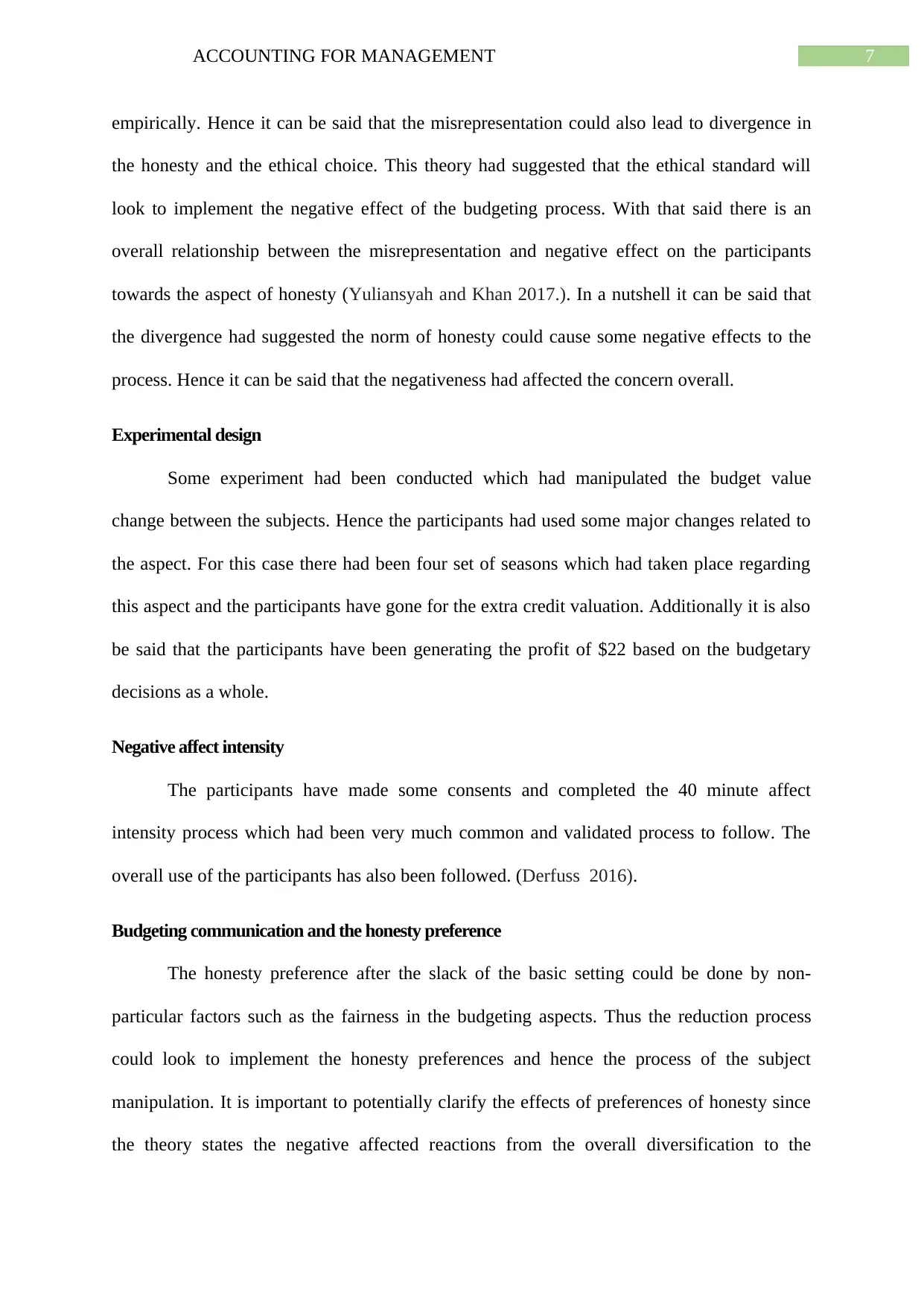
7ACCOUNTING FOR MANAGEMENT
empirically. Hence it can be said that the misrepresentation could also lead to divergence in
the honesty and the ethical choice. This theory had suggested that the ethical standard will
look to implement the negative effect of the budgeting process. With that said there is an
overall relationship between the misrepresentation and negative effect on the participants
towards the aspect of honesty (Yuliansyah and Khan 2017.). In a nutshell it can be said that
the divergence had suggested the norm of honesty could cause some negative effects to the
process. Hence it can be said that the negativeness had affected the concern overall.
Experimental design
Some experiment had been conducted which had manipulated the budget value
change between the subjects. Hence the participants had used some major changes related to
the aspect. For this case there had been four set of seasons which had taken place regarding
this aspect and the participants have gone for the extra credit valuation. Additionally it is also
be said that the participants have been generating the profit of $22 based on the budgetary
decisions as a whole.
Negative affect intensity
The participants have made some consents and completed the 40 minute affect
intensity process which had been very much common and validated process to follow. The
overall use of the participants has also been followed. (Derfuss 2016).
Budgeting communication and the honesty preference
The honesty preference after the slack of the basic setting could be done by non-
particular factors such as the fairness in the budgeting aspects. Thus the reduction process
could look to implement the honesty preferences and hence the process of the subject
manipulation. It is important to potentially clarify the effects of preferences of honesty since
the theory states the negative affected reactions from the overall diversification to the
empirically. Hence it can be said that the misrepresentation could also lead to divergence in
the honesty and the ethical choice. This theory had suggested that the ethical standard will
look to implement the negative effect of the budgeting process. With that said there is an
overall relationship between the misrepresentation and negative effect on the participants
towards the aspect of honesty (Yuliansyah and Khan 2017.). In a nutshell it can be said that
the divergence had suggested the norm of honesty could cause some negative effects to the
process. Hence it can be said that the negativeness had affected the concern overall.
Experimental design
Some experiment had been conducted which had manipulated the budget value
change between the subjects. Hence the participants had used some major changes related to
the aspect. For this case there had been four set of seasons which had taken place regarding
this aspect and the participants have gone for the extra credit valuation. Additionally it is also
be said that the participants have been generating the profit of $22 based on the budgetary
decisions as a whole.
Negative affect intensity
The participants have made some consents and completed the 40 minute affect
intensity process which had been very much common and validated process to follow. The
overall use of the participants has also been followed. (Derfuss 2016).
Budgeting communication and the honesty preference
The honesty preference after the slack of the basic setting could be done by non-
particular factors such as the fairness in the budgeting aspects. Thus the reduction process
could look to implement the honesty preferences and hence the process of the subject
manipulation. It is important to potentially clarify the effects of preferences of honesty since
the theory states the negative affected reactions from the overall diversification to the
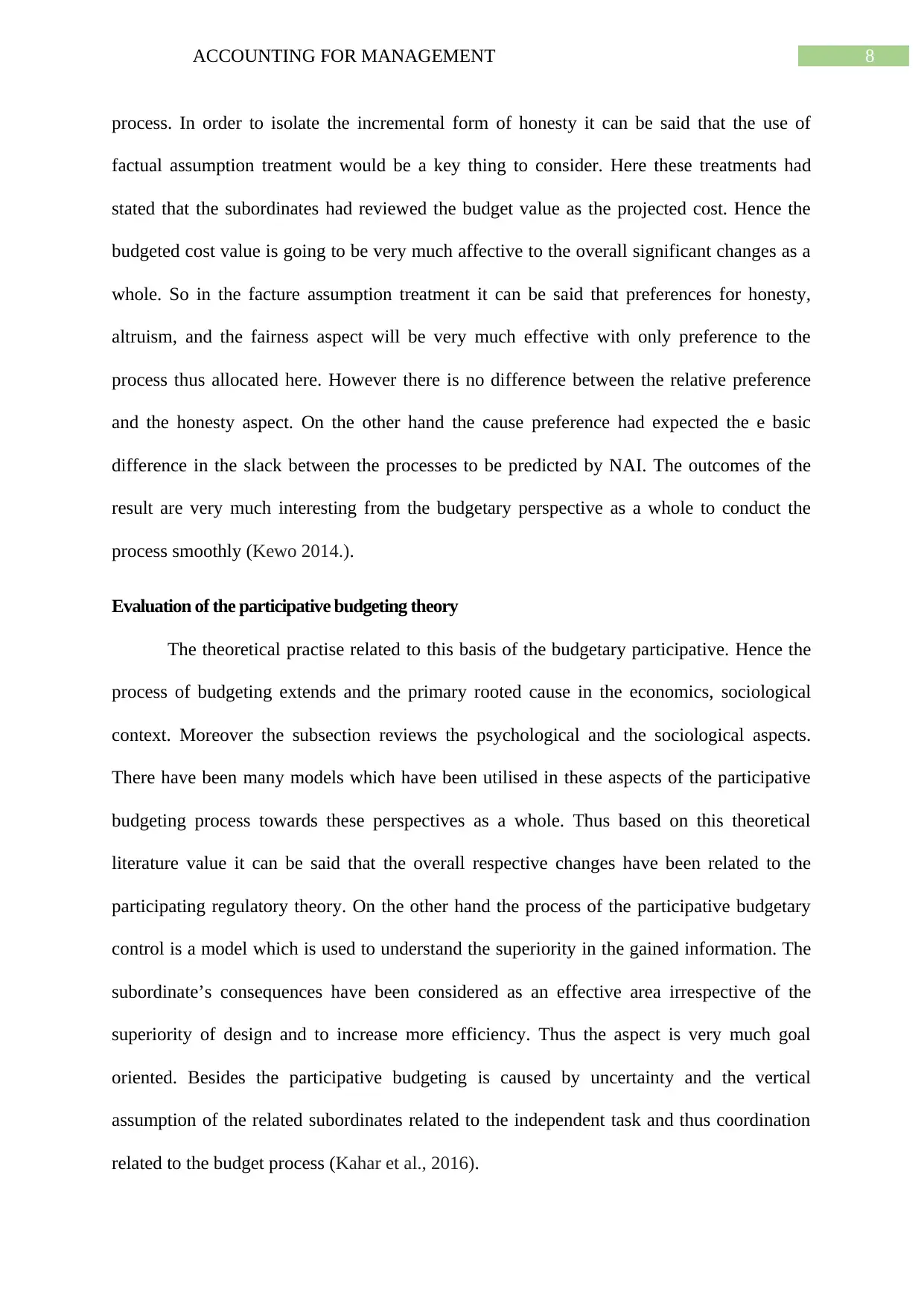
8ACCOUNTING FOR MANAGEMENT
process. In order to isolate the incremental form of honesty it can be said that the use of
factual assumption treatment would be a key thing to consider. Here these treatments had
stated that the subordinates had reviewed the budget value as the projected cost. Hence the
budgeted cost value is going to be very much affective to the overall significant changes as a
whole. So in the facture assumption treatment it can be said that preferences for honesty,
altruism, and the fairness aspect will be very much effective with only preference to the
process thus allocated here. However there is no difference between the relative preference
and the honesty aspect. On the other hand the cause preference had expected the e basic
difference in the slack between the processes to be predicted by NAI. The outcomes of the
result are very much interesting from the budgetary perspective as a whole to conduct the
process smoothly (Kewo 2014.).
Evaluation of the participative budgeting theory
The theoretical practise related to this basis of the budgetary participative. Hence the
process of budgeting extends and the primary rooted cause in the economics, sociological
context. Moreover the subsection reviews the psychological and the sociological aspects.
There have been many models which have been utilised in these aspects of the participative
budgeting process towards these perspectives as a whole. Thus based on this theoretical
literature value it can be said that the overall respective changes have been related to the
participating regulatory theory. On the other hand the process of the participative budgetary
control is a model which is used to understand the superiority in the gained information. The
subordinate’s consequences have been considered as an effective area irrespective of the
superiority of design and to increase more efficiency. Thus the aspect is very much goal
oriented. Besides the participative budgeting is caused by uncertainty and the vertical
assumption of the related subordinates related to the independent task and thus coordination
related to the budget process (Kahar et al., 2016).
process. In order to isolate the incremental form of honesty it can be said that the use of
factual assumption treatment would be a key thing to consider. Here these treatments had
stated that the subordinates had reviewed the budget value as the projected cost. Hence the
budgeted cost value is going to be very much affective to the overall significant changes as a
whole. So in the facture assumption treatment it can be said that preferences for honesty,
altruism, and the fairness aspect will be very much effective with only preference to the
process thus allocated here. However there is no difference between the relative preference
and the honesty aspect. On the other hand the cause preference had expected the e basic
difference in the slack between the processes to be predicted by NAI. The outcomes of the
result are very much interesting from the budgetary perspective as a whole to conduct the
process smoothly (Kewo 2014.).
Evaluation of the participative budgeting theory
The theoretical practise related to this basis of the budgetary participative. Hence the
process of budgeting extends and the primary rooted cause in the economics, sociological
context. Moreover the subsection reviews the psychological and the sociological aspects.
There have been many models which have been utilised in these aspects of the participative
budgeting process towards these perspectives as a whole. Thus based on this theoretical
literature value it can be said that the overall respective changes have been related to the
participating regulatory theory. On the other hand the process of the participative budgetary
control is a model which is used to understand the superiority in the gained information. The
subordinate’s consequences have been considered as an effective area irrespective of the
superiority of design and to increase more efficiency. Thus the aspect is very much goal
oriented. Besides the participative budgeting is caused by uncertainty and the vertical
assumption of the related subordinates related to the independent task and thus coordination
related to the budget process (Kahar et al., 2016).
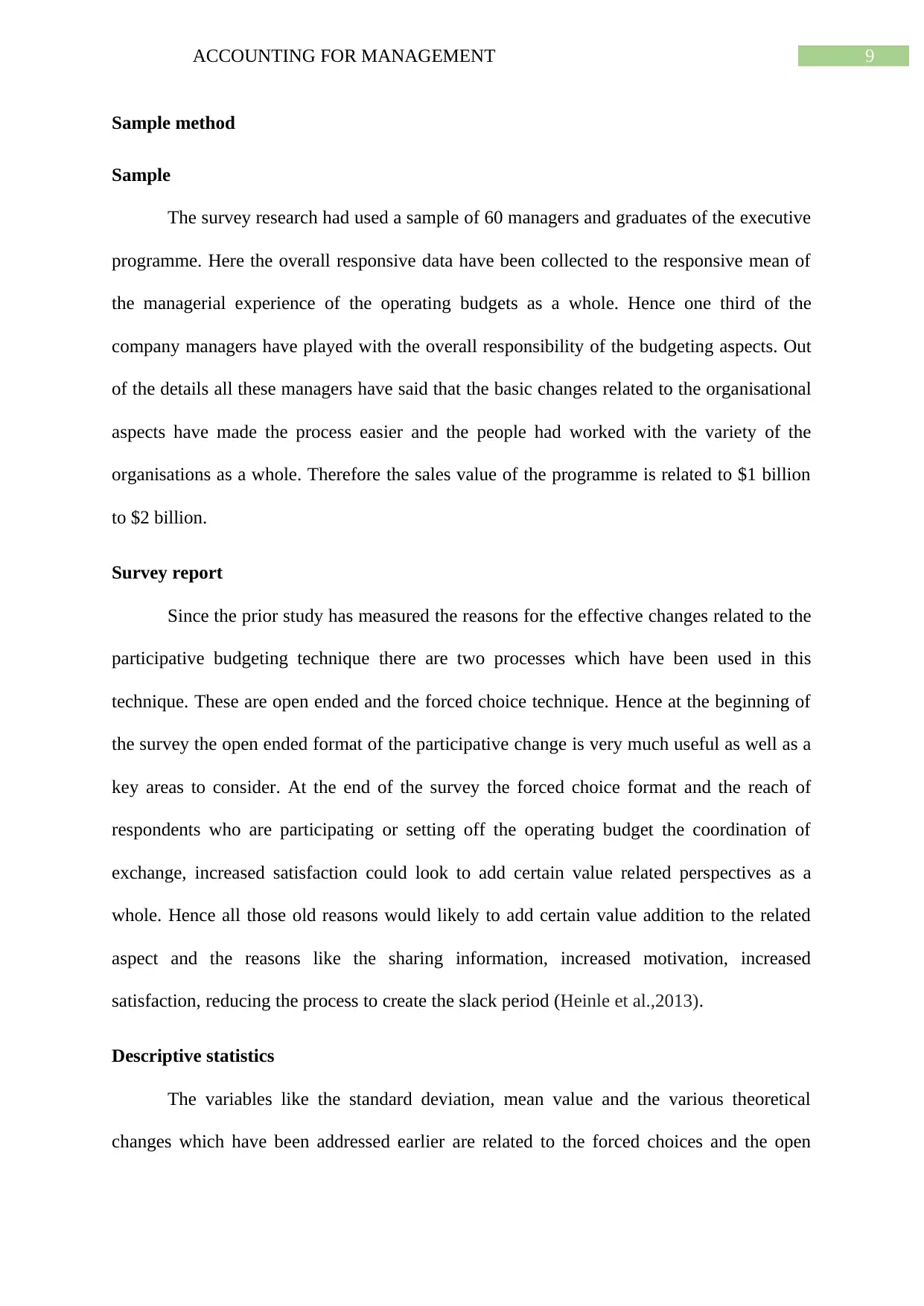
9ACCOUNTING FOR MANAGEMENT
Sample method
Sample
The survey research had used a sample of 60 managers and graduates of the executive
programme. Here the overall responsive data have been collected to the responsive mean of
the managerial experience of the operating budgets as a whole. Hence one third of the
company managers have played with the overall responsibility of the budgeting aspects. Out
of the details all these managers have said that the basic changes related to the organisational
aspects have made the process easier and the people had worked with the variety of the
organisations as a whole. Therefore the sales value of the programme is related to $1 billion
to $2 billion.
Survey report
Since the prior study has measured the reasons for the effective changes related to the
participative budgeting technique there are two processes which have been used in this
technique. These are open ended and the forced choice technique. Hence at the beginning of
the survey the open ended format of the participative change is very much useful as well as a
key areas to consider. At the end of the survey the forced choice format and the reach of
respondents who are participating or setting off the operating budget the coordination of
exchange, increased satisfaction could look to add certain value related perspectives as a
whole. Hence all those old reasons would likely to add certain value addition to the related
aspect and the reasons like the sharing information, increased motivation, increased
satisfaction, reducing the process to create the slack period (Heinle et al.,2013).
Descriptive statistics
The variables like the standard deviation, mean value and the various theoretical
changes which have been addressed earlier are related to the forced choices and the open
Sample method
Sample
The survey research had used a sample of 60 managers and graduates of the executive
programme. Here the overall responsive data have been collected to the responsive mean of
the managerial experience of the operating budgets as a whole. Hence one third of the
company managers have played with the overall responsibility of the budgeting aspects. Out
of the details all these managers have said that the basic changes related to the organisational
aspects have made the process easier and the people had worked with the variety of the
organisations as a whole. Therefore the sales value of the programme is related to $1 billion
to $2 billion.
Survey report
Since the prior study has measured the reasons for the effective changes related to the
participative budgeting technique there are two processes which have been used in this
technique. These are open ended and the forced choice technique. Hence at the beginning of
the survey the open ended format of the participative change is very much useful as well as a
key areas to consider. At the end of the survey the forced choice format and the reach of
respondents who are participating or setting off the operating budget the coordination of
exchange, increased satisfaction could look to add certain value related perspectives as a
whole. Hence all those old reasons would likely to add certain value addition to the related
aspect and the reasons like the sharing information, increased motivation, increased
satisfaction, reducing the process to create the slack period (Heinle et al.,2013).
Descriptive statistics
The variables like the standard deviation, mean value and the various theoretical
changes which have been addressed earlier are related to the forced choices and the open
Secure Best Marks with AI Grader
Need help grading? Try our AI Grader for instant feedback on your assignments.
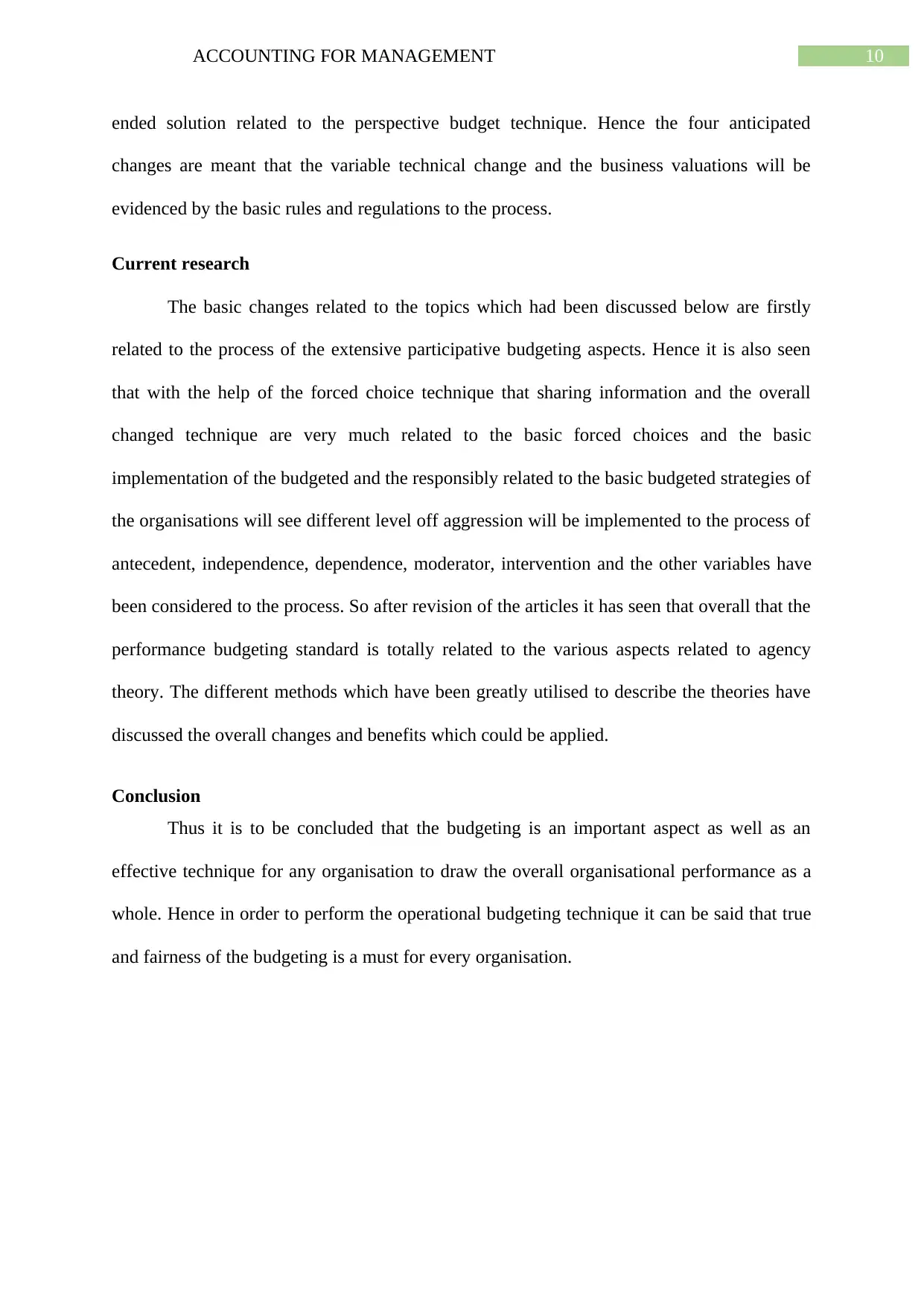
10ACCOUNTING FOR MANAGEMENT
ended solution related to the perspective budget technique. Hence the four anticipated
changes are meant that the variable technical change and the business valuations will be
evidenced by the basic rules and regulations to the process.
Current research
The basic changes related to the topics which had been discussed below are firstly
related to the process of the extensive participative budgeting aspects. Hence it is also seen
that with the help of the forced choice technique that sharing information and the overall
changed technique are very much related to the basic forced choices and the basic
implementation of the budgeted and the responsibly related to the basic budgeted strategies of
the organisations will see different level off aggression will be implemented to the process of
antecedent, independence, dependence, moderator, intervention and the other variables have
been considered to the process. So after revision of the articles it has seen that overall that the
performance budgeting standard is totally related to the various aspects related to agency
theory. The different methods which have been greatly utilised to describe the theories have
discussed the overall changes and benefits which could be applied.
Conclusion
Thus it is to be concluded that the budgeting is an important aspect as well as an
effective technique for any organisation to draw the overall organisational performance as a
whole. Hence in order to perform the operational budgeting technique it can be said that true
and fairness of the budgeting is a must for every organisation.
ended solution related to the perspective budget technique. Hence the four anticipated
changes are meant that the variable technical change and the business valuations will be
evidenced by the basic rules and regulations to the process.
Current research
The basic changes related to the topics which had been discussed below are firstly
related to the process of the extensive participative budgeting aspects. Hence it is also seen
that with the help of the forced choice technique that sharing information and the overall
changed technique are very much related to the basic forced choices and the basic
implementation of the budgeted and the responsibly related to the basic budgeted strategies of
the organisations will see different level off aggression will be implemented to the process of
antecedent, independence, dependence, moderator, intervention and the other variables have
been considered to the process. So after revision of the articles it has seen that overall that the
performance budgeting standard is totally related to the various aspects related to agency
theory. The different methods which have been greatly utilised to describe the theories have
discussed the overall changes and benefits which could be applied.
Conclusion
Thus it is to be concluded that the budgeting is an important aspect as well as an
effective technique for any organisation to draw the overall organisational performance as a
whole. Hence in order to perform the operational budgeting technique it can be said that true
and fairness of the budgeting is a must for every organisation.
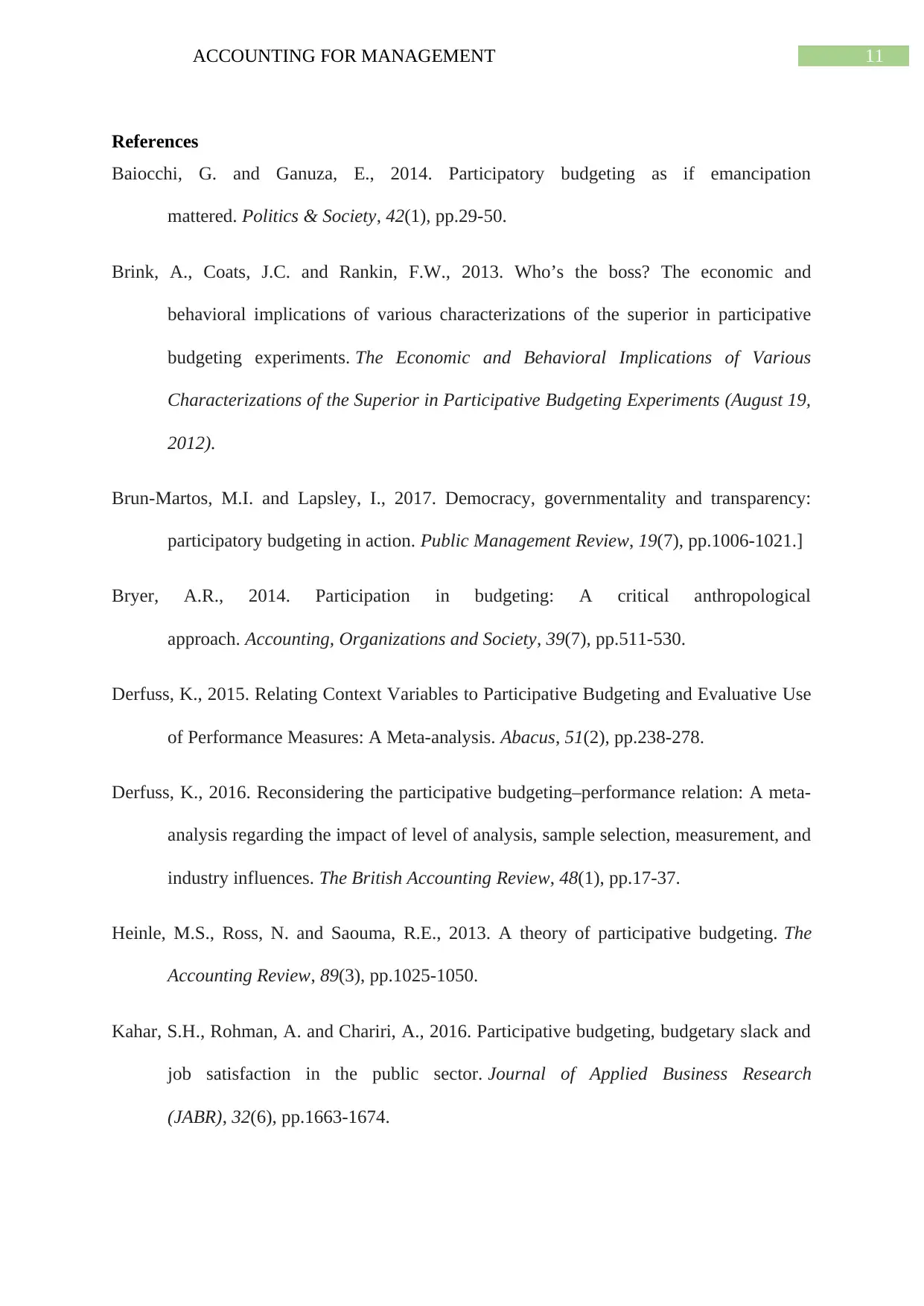
11ACCOUNTING FOR MANAGEMENT
References
Baiocchi, G. and Ganuza, E., 2014. Participatory budgeting as if emancipation
mattered. Politics & Society, 42(1), pp.29-50.
Brink, A., Coats, J.C. and Rankin, F.W., 2013. Who’s the boss? The economic and
behavioral implications of various characterizations of the superior in participative
budgeting experiments. The Economic and Behavioral Implications of Various
Characterizations of the Superior in Participative Budgeting Experiments (August 19,
2012).
Brun-Martos, M.I. and Lapsley, I., 2017. Democracy, governmentality and transparency:
participatory budgeting in action. Public Management Review, 19(7), pp.1006-1021.]
Bryer, A.R., 2014. Participation in budgeting: A critical anthropological
approach. Accounting, Organizations and Society, 39(7), pp.511-530.
Derfuss, K., 2015. Relating Context Variables to Participative Budgeting and Evaluative Use
of Performance Measures: A Meta‐analysis. Abacus, 51(2), pp.238-278.
Derfuss, K., 2016. Reconsidering the participative budgeting–performance relation: A meta-
analysis regarding the impact of level of analysis, sample selection, measurement, and
industry influences. The British Accounting Review, 48(1), pp.17-37.
Heinle, M.S., Ross, N. and Saouma, R.E., 2013. A theory of participative budgeting. The
Accounting Review, 89(3), pp.1025-1050.
Kahar, S.H., Rohman, A. and Chariri, A., 2016. Participative budgeting, budgetary slack and
job satisfaction in the public sector. Journal of Applied Business Research
(JABR), 32(6), pp.1663-1674.
References
Baiocchi, G. and Ganuza, E., 2014. Participatory budgeting as if emancipation
mattered. Politics & Society, 42(1), pp.29-50.
Brink, A., Coats, J.C. and Rankin, F.W., 2013. Who’s the boss? The economic and
behavioral implications of various characterizations of the superior in participative
budgeting experiments. The Economic and Behavioral Implications of Various
Characterizations of the Superior in Participative Budgeting Experiments (August 19,
2012).
Brun-Martos, M.I. and Lapsley, I., 2017. Democracy, governmentality and transparency:
participatory budgeting in action. Public Management Review, 19(7), pp.1006-1021.]
Bryer, A.R., 2014. Participation in budgeting: A critical anthropological
approach. Accounting, Organizations and Society, 39(7), pp.511-530.
Derfuss, K., 2015. Relating Context Variables to Participative Budgeting and Evaluative Use
of Performance Measures: A Meta‐analysis. Abacus, 51(2), pp.238-278.
Derfuss, K., 2016. Reconsidering the participative budgeting–performance relation: A meta-
analysis regarding the impact of level of analysis, sample selection, measurement, and
industry influences. The British Accounting Review, 48(1), pp.17-37.
Heinle, M.S., Ross, N. and Saouma, R.E., 2013. A theory of participative budgeting. The
Accounting Review, 89(3), pp.1025-1050.
Kahar, S.H., Rohman, A. and Chariri, A., 2016. Participative budgeting, budgetary slack and
job satisfaction in the public sector. Journal of Applied Business Research
(JABR), 32(6), pp.1663-1674.
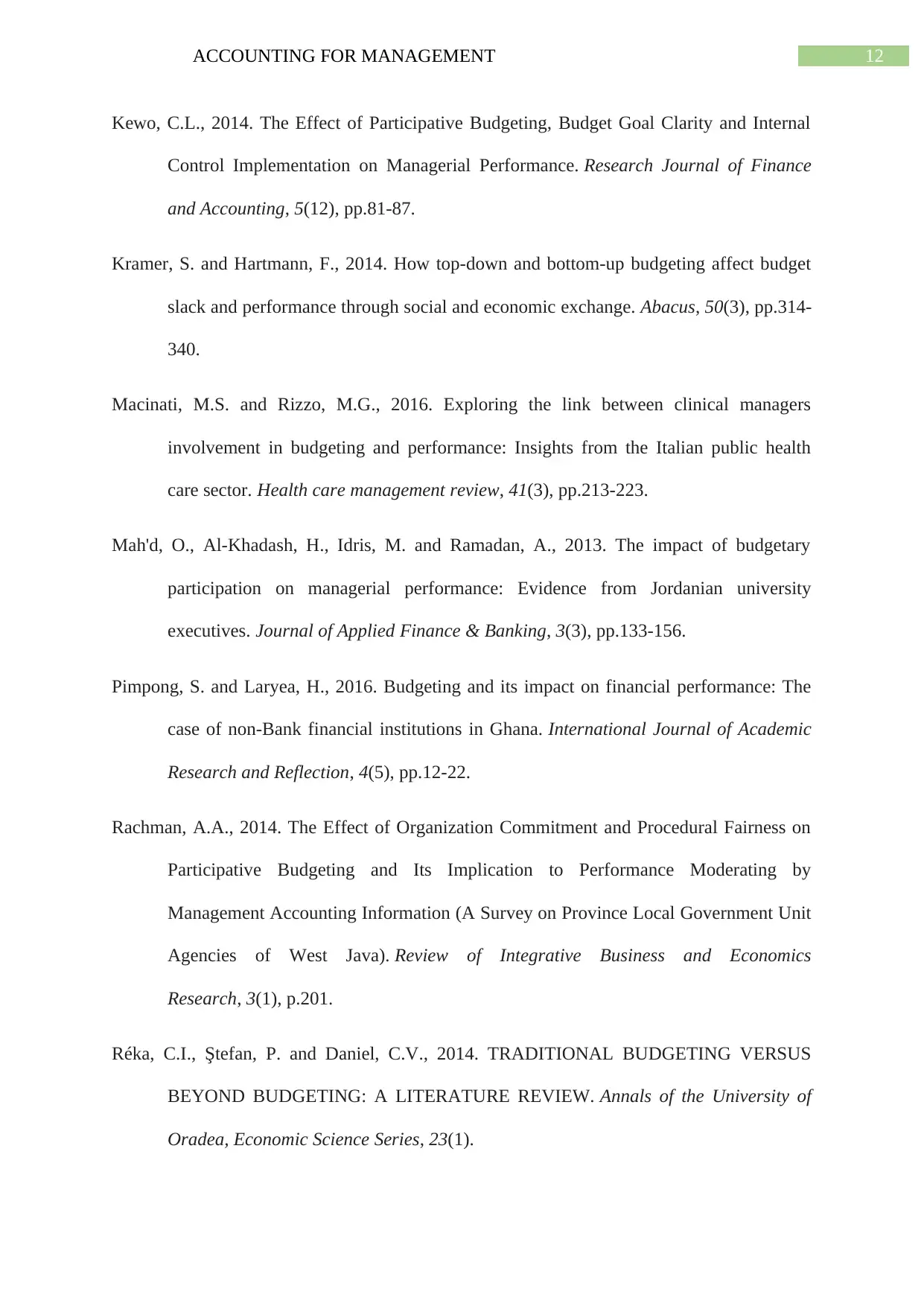
12ACCOUNTING FOR MANAGEMENT
Kewo, C.L., 2014. The Effect of Participative Budgeting, Budget Goal Clarity and Internal
Control Implementation on Managerial Performance. Research Journal of Finance
and Accounting, 5(12), pp.81-87.
Kramer, S. and Hartmann, F., 2014. How top‐down and bottom‐up budgeting affect budget
slack and performance through social and economic exchange. Abacus, 50(3), pp.314-
340.
Macinati, M.S. and Rizzo, M.G., 2016. Exploring the link between clinical managers
involvement in budgeting and performance: Insights from the Italian public health
care sector. Health care management review, 41(3), pp.213-223.
Mah'd, O., Al-Khadash, H., Idris, M. and Ramadan, A., 2013. The impact of budgetary
participation on managerial performance: Evidence from Jordanian university
executives. Journal of Applied Finance & Banking, 3(3), pp.133-156.
Pimpong, S. and Laryea, H., 2016. Budgeting and its impact on financial performance: The
case of non-Bank financial institutions in Ghana. International Journal of Academic
Research and Reflection, 4(5), pp.12-22.
Rachman, A.A., 2014. The Effect of Organization Commitment and Procedural Fairness on
Participative Budgeting and Its Implication to Performance Moderating by
Management Accounting Information (A Survey on Province Local Government Unit
Agencies of West Java). Review of Integrative Business and Economics
Research, 3(1), p.201.
Réka, C.I., Ştefan, P. and Daniel, C.V., 2014. TRADITIONAL BUDGETING VERSUS
BEYOND BUDGETING: A LITERATURE REVIEW. Annals of the University of
Oradea, Economic Science Series, 23(1).
Kewo, C.L., 2014. The Effect of Participative Budgeting, Budget Goal Clarity and Internal
Control Implementation on Managerial Performance. Research Journal of Finance
and Accounting, 5(12), pp.81-87.
Kramer, S. and Hartmann, F., 2014. How top‐down and bottom‐up budgeting affect budget
slack and performance through social and economic exchange. Abacus, 50(3), pp.314-
340.
Macinati, M.S. and Rizzo, M.G., 2016. Exploring the link between clinical managers
involvement in budgeting and performance: Insights from the Italian public health
care sector. Health care management review, 41(3), pp.213-223.
Mah'd, O., Al-Khadash, H., Idris, M. and Ramadan, A., 2013. The impact of budgetary
participation on managerial performance: Evidence from Jordanian university
executives. Journal of Applied Finance & Banking, 3(3), pp.133-156.
Pimpong, S. and Laryea, H., 2016. Budgeting and its impact on financial performance: The
case of non-Bank financial institutions in Ghana. International Journal of Academic
Research and Reflection, 4(5), pp.12-22.
Rachman, A.A., 2014. The Effect of Organization Commitment and Procedural Fairness on
Participative Budgeting and Its Implication to Performance Moderating by
Management Accounting Information (A Survey on Province Local Government Unit
Agencies of West Java). Review of Integrative Business and Economics
Research, 3(1), p.201.
Réka, C.I., Ştefan, P. and Daniel, C.V., 2014. TRADITIONAL BUDGETING VERSUS
BEYOND BUDGETING: A LITERATURE REVIEW. Annals of the University of
Oradea, Economic Science Series, 23(1).
Paraphrase This Document
Need a fresh take? Get an instant paraphrase of this document with our AI Paraphraser
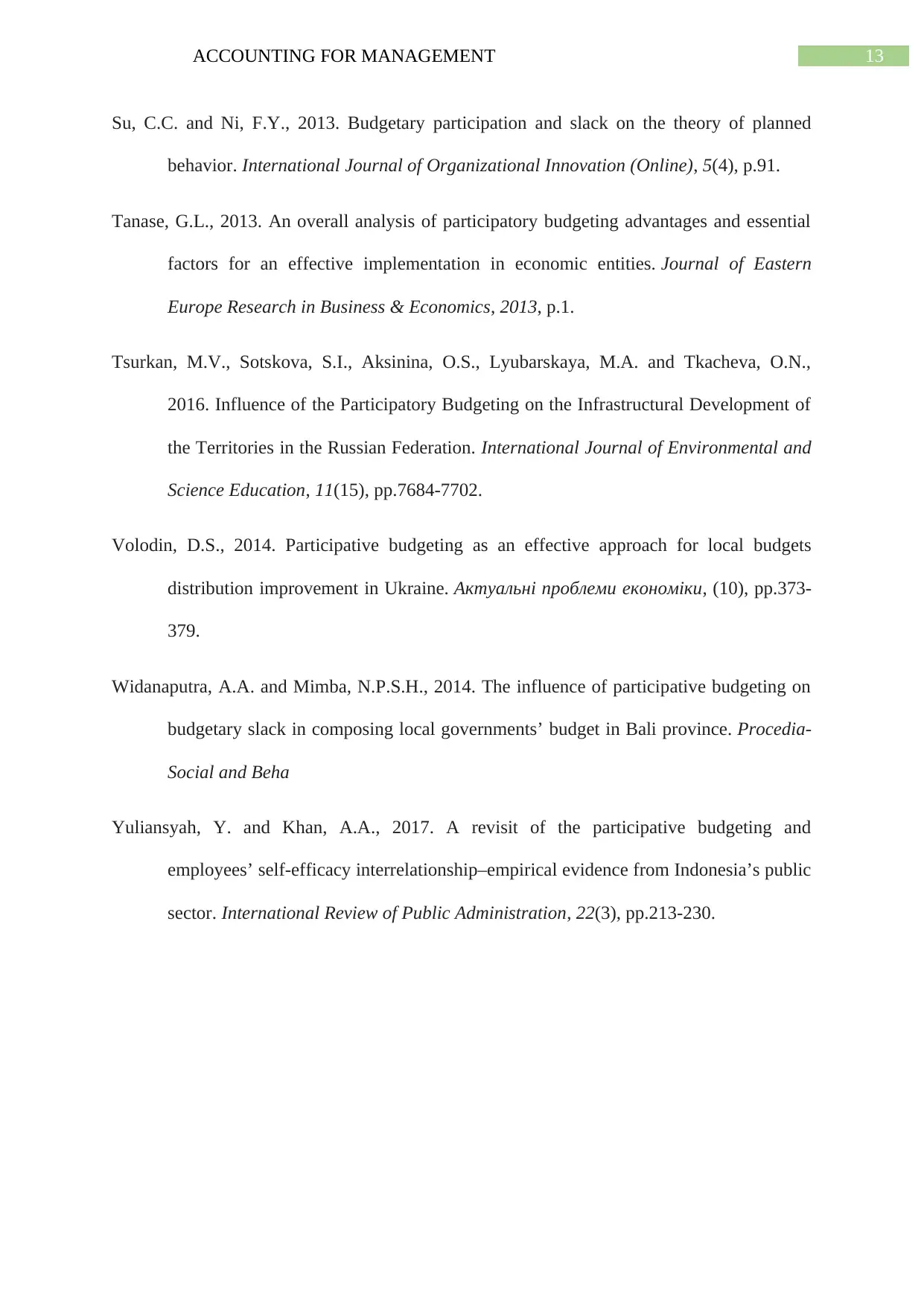
13ACCOUNTING FOR MANAGEMENT
Su, C.C. and Ni, F.Y., 2013. Budgetary participation and slack on the theory of planned
behavior. International Journal of Organizational Innovation (Online), 5(4), p.91.
Tanase, G.L., 2013. An overall analysis of participatory budgeting advantages and essential
factors for an effective implementation in economic entities. Journal of Eastern
Europe Research in Business & Economics, 2013, p.1.
Tsurkan, M.V., Sotskova, S.I., Aksinina, O.S., Lyubarskaya, M.A. and Tkacheva, O.N.,
2016. Influence of the Participatory Budgeting on the Infrastructural Development of
the Territories in the Russian Federation. International Journal of Environmental and
Science Education, 11(15), pp.7684-7702.
Volodin, D.S., 2014. Participative budgeting as an effective approach for local budgets
distribution improvement in Ukraine. Актуальні проблеми економіки, (10), pp.373-
379.
Widanaputra, A.A. and Mimba, N.P.S.H., 2014. The influence of participative budgeting on
budgetary slack in composing local governments’ budget in Bali province. Procedia-
Social and Beha
Yuliansyah, Y. and Khan, A.A., 2017. A revisit of the participative budgeting and
employees’ self-efficacy interrelationship–empirical evidence from Indonesia’s public
sector. International Review of Public Administration, 22(3), pp.213-230.
Su, C.C. and Ni, F.Y., 2013. Budgetary participation and slack on the theory of planned
behavior. International Journal of Organizational Innovation (Online), 5(4), p.91.
Tanase, G.L., 2013. An overall analysis of participatory budgeting advantages and essential
factors for an effective implementation in economic entities. Journal of Eastern
Europe Research in Business & Economics, 2013, p.1.
Tsurkan, M.V., Sotskova, S.I., Aksinina, O.S., Lyubarskaya, M.A. and Tkacheva, O.N.,
2016. Influence of the Participatory Budgeting on the Infrastructural Development of
the Territories in the Russian Federation. International Journal of Environmental and
Science Education, 11(15), pp.7684-7702.
Volodin, D.S., 2014. Participative budgeting as an effective approach for local budgets
distribution improvement in Ukraine. Актуальні проблеми економіки, (10), pp.373-
379.
Widanaputra, A.A. and Mimba, N.P.S.H., 2014. The influence of participative budgeting on
budgetary slack in composing local governments’ budget in Bali province. Procedia-
Social and Beha
Yuliansyah, Y. and Khan, A.A., 2017. A revisit of the participative budgeting and
employees’ self-efficacy interrelationship–empirical evidence from Indonesia’s public
sector. International Review of Public Administration, 22(3), pp.213-230.
1 out of 14
Your All-in-One AI-Powered Toolkit for Academic Success.
+13062052269
info@desklib.com
Available 24*7 on WhatsApp / Email
![[object Object]](/_next/static/media/star-bottom.7253800d.svg)
Unlock your academic potential
© 2024 | Zucol Services PVT LTD | All rights reserved.


